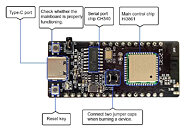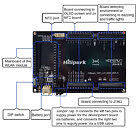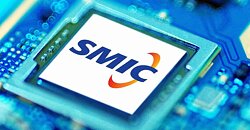US Government Reportedly Eyeing Expansion of Chinese Chipmaker "Export Blacklist" - Insiders Mention CXMT
According to a Financial Times (FT) news article, the US Government's Bureau of Industry and Security (BIS) is considering an implementation of additional "export blacklist" entries. Roughly two months ago, a significant update affected the export trade of around eighty Chinese business "entities." Despite a recent "cooling off" of elevated tariff-related activities, significant political tensions still exist between the two powerhouse nations. According to five of FT's unnamed insiders, ChangXin Memory Technologies (CXMT)—a rising star within China's growing memory manufacturing industry—is a potential candidate for "banishment." Semiconductor Manufacturing International Corp (SMIC), and Yangtze Memory Technologies Co. are (allegedly) already categorized as blacklisted organizations.
Apparently, the nation's most prominent chipmaker and memory module producer (respectively) have managed to sidestep certain restrictions, via offshoot avenues. FT believes that the US administration is actively investigating several of these subsidiaries. CXMT seems to be an independent body, with no military connections—specializing in commercial DDR5 and DDR4 products—but its rising profile has attracted international attention. Around March 2024, Bloomberg heard rumors about the US BIS department's "weighing up" of sanctions, with CXMT in mind. The relatively young DRAM manufacturer (established back in 2016) still trails behind South Korean and Western competitors, in terms of technological advancements—but its initial DDR5 efforts have (supposedly) impressed local evaluators and early adopters.
Apparently, the nation's most prominent chipmaker and memory module producer (respectively) have managed to sidestep certain restrictions, via offshoot avenues. FT believes that the US administration is actively investigating several of these subsidiaries. CXMT seems to be an independent body, with no military connections—specializing in commercial DDR5 and DDR4 products—but its rising profile has attracted international attention. Around March 2024, Bloomberg heard rumors about the US BIS department's "weighing up" of sanctions, with CXMT in mind. The relatively young DRAM manufacturer (established back in 2016) still trails behind South Korean and Western competitors, in terms of technological advancements—but its initial DDR5 efforts have (supposedly) impressed local evaluators and early adopters.
























